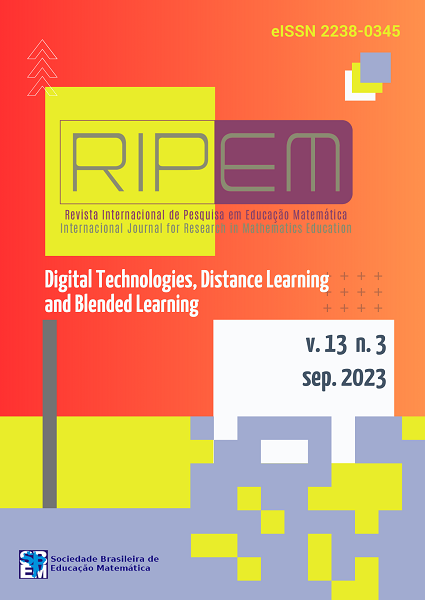Interdisciplinarity with digital mathematical cartoons during Emergency Remote Teaching in Elementary School
DOI:
https://doi.org/10.37001/ripem.v13i3.3359Palavras-chave:
Cartoons, Mathematics Teaching, Digital Technologies, PandemicResumo
The objective of this article is to analyze how the minicyclones of expansive learning occurred during the development of mathematical tasks that involve the production of digital mathematical cartoons with 6th students at an elementary school in the interior of Brazil during the pandemic, Covid-19. 19. Thus, we base ourselves on the humans-with-media system and on qualitative research, whose sources and data production instruments were: field notes, questionnaires, audiovisual recordings, and student handouts. We analyzed the data through the method of analytical induction considering the analytical tool of minicyclones of expansive learning. The results indicated that minicyclones of expansive learning occur with expansion movements — questioning, criticism, and relationships between mathematics and society — at certain times and retraction movements — structured tasks and ready-made answers — at others. We conclude that thinking about approaches to break with the stable pattern of teaching and learning mathematics is something complex.
Downloads
Referências
Anchau, F. R. & Souto, D. L. P. (2022). Contribuições da produção de vÃdeos de matemática financeira para o VI Festival de vÃdeos digitais e Educação Matemática. Anais da 2º Semana Acadêmica da Pesquisa e Inovação. (pp. 51-66). Barra do Bugres, MT: Universidade do Estado de Mato Grosso.
Borba, M. C. (2021). The future of mathematics education since COVID-19: humans-with-media or humans-with-non-living-things. Educational Studies in Mathematics-Educ Stud Math, 108, 385-400.
Borba, M. C.; Silva, R. S. R. & Gadanidis, G. (2018). Fases das tecnologias digitais em Educação Matemática: sala de aula e internet em movimento. (2. ed.). Belo Horizonte, MG: Autêntica Editora.
Borba, M. C. (1999). Tecnologias Informáticas na Educação Matemática e reorganização do pensamento. In: M. A. V. Bicudo. (Org). Pesquisa em Educação Matemática: concepções e perspectivas (p. 285-295). São Paulo, SP: EdUnesp.
Borba, M. C.; Souto, D. L. P. & Canedo Junior, N. R. (2022). VÃdeos na Educação Matemática: Paulo Freire e a quinta fase das tecnologias digitais. Belo Horizonte, MG: Autêntica.
Borba, M. C. & Villarreal, M. E. (2005). Humans-with-Media and the Reorganization of Mathematical Thinking: information and communication technologies, modeling, experimentation and visualization. New York, NY: Springer Science & Business Media.
Borba, M. C. & Araújo, J. L. (2019). Pesquisa qualitativa em educação Matemática. (6. ed.). Belo Horizonte, MG: Autêntica.
Cunha, J. F. T,; Borba, M. C. & Souto, D. L. P.; (2022). Agency em coletivos seres-humanos-com-vÃdeos: escolhas teóricas e metodológicas de uma investigação na pandemia da Covid-19. In: Anais do XIV Encontro Nacional de Educação Matemática. (pp. 1-10) BrasÃlia, DF: SBEM.
Costa, R. F. (2017). Aprendizagem da Matemática com cartoons: qual o papel das tecnologias digitais?. 2017. 175f. Dissertação (Mestrado em Ensino de Ciências e Matemática). Universidade Estadual de Mato Grosso. Barra do Bugres, MT.
Costa, R. F. (2020). Tecnologias digitais e cartoons matemáticos: promovendo a interdisciplinaridade. Revista Sergipana de Matemática e Educação Matemática, 5(1), 336-357.
Deslauriers, J. P. (2008). A Indução AnalÃtica. In. J. Poupart, J. P. Deslauriers, L. Groulx, A. Lamperrière, R. Mayer, P. P. Pires. (Org.). A pesquisa qualitativa: enfoques epistemológicos e metodológicos (2 ed., pp. 337-352). Petrópolis, RJ: Vozes.
Engeström, Y. (1999). Activity Theory and individual and social transformations. In: Y. Engeström; R. Miettinem; L. Punamãki. (Ed.). Perspectives on Activity Theory (pp. 19-38). Cambridge, MA: Cambridge University Press.
Engeström, Y. (2001). Expansive learning at work: toward an activity theoretical reconceptualization. Journal of Education and Work, 14(1), 133-156.
Engestrom, Y. (1987). Learning by Expanding: an activity-theoretical approach to develop-mental research. Hesinki: Orienta-Konsultit.
Hardman, J. (2007). Making sense of the meaning maker: tracking the object of activity in a computer-based mathematics lesson using activity theory. International Journal of Education and Development using ICT- University of Cape Town, 3(4), 110, 1-23.
Souto, D. L. P. (2015). Aprendizagem matemática on-line: quando tensões geram conflitos. Revista Educação Matemática, 5(17), 942-972.
Souto, D. L. P. (2014). Transformações expansivas na produção matemática online. São Paulo, SP: Cultura Acadêmica.
Souto, D. L. P. & Araújo, J. L. (2013). Possibilidades expansivas do sistema seres-humanos-com-mÃdias: um encontro com a teoria da atividade. In: M. C. Borba & A. Chiari. (Org.) Tecnologias digitais e Educação Matemática (pp. 71-90). São Paulo, SP: Editora Livraria da FÃsica.
Souto, D. L. P. (2013). Transformações expansivas em um curso de Educação Matemática a Distância Online. 2013. 279f. Tese (Doutorado em Educação Matemática). Universidade Estadual Paulista. Rio Claro, SP.
Souto, D. L. P. & Borba, M. C. (2013). Transformações expansivas em sistemas de atividade: o caso da produção matemática com a internet. Perspectivas da Educação Matemática, 6, 41-57.
Souto, D. L. P. & Borba, M. C. (2018). Humans-With-Internet or Internet-With-Humans: a role reversal? Revista Internacional de Pesquisa em Educação Matemática, 8(3), 2-23.
Souto, D. L. P. & Borba, M. C. (2016). Aprendizagem de Professores com a Produção de VÃdeos para Aulas de Matemática. Educação Matemática em Revista, 52, 54-64.
Publicado
Como Citar
Edição
Seção

Este trabalho está licensiado sob uma licença Creative Commons Attribution-NonCommercial-ShareAlike 4.0 International License.








